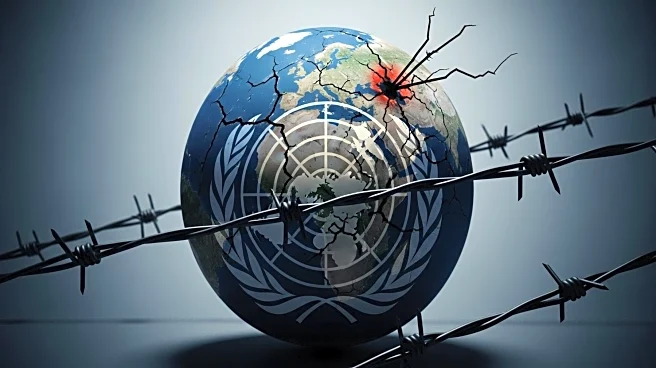What's Happening?
Houthi forces in Yemen have detained at least 11 United Nations staff members following an Israeli airstrike that killed Houthi Prime Minister Ahmed al-Rahawi and several other ministers. The UN envoy to Yemen, Hans Grundberg, condemned the detentions and the raids on UN facilities in Sanaa and Hodeidah. The Israeli strike targeted a meeting of senior Houthi officials, resulting in significant casualties among the group's leadership. The attack has intensified tensions in the region, with Houthi Chief of Staff Abdul Karim al-Ghamari, who was wounded in the strike, threatening retaliation against Israel. The incident has sparked outrage among Sanaa residents, who view the strike as a violation of Yemen's sovereignty.
Why It's Important?
The detention of UN staff by Houthi forces highlights the escalating conflict in Yemen and the potential for broader geopolitical implications. The Israeli strike and subsequent Houthi response could further destabilize the region, impacting international diplomatic efforts and humanitarian operations. The UN's ability to operate in Houthi-controlled areas is compromised, affecting aid delivery and peacekeeping efforts. The incident underscores the complex interplay of regional powers, including Iran's support for the Houthis, and the potential for increased military engagements involving Israel. The situation poses risks to global security and humanitarian stability, with potential repercussions for international relations and regional alliances.
What's Next?
The international community, including the United Nations, is likely to increase diplomatic pressure on the Houthis to release the detained staff and ensure the safety of UN personnel. Israel may face heightened security threats from Houthi forces, prompting potential military responses or strategic adjustments. The situation may lead to increased involvement from regional and global powers, seeking to mediate or influence the conflict's trajectory. Humanitarian organizations may need to reassess their operations in Yemen, considering the risks posed by the ongoing conflict and the detention of international staff.
Beyond the Headlines
The incident raises ethical and legal questions regarding the protection of international personnel in conflict zones and the responsibilities of state and non-state actors. The targeting of UN facilities and personnel challenges international norms and could lead to calls for stronger protective measures and accountability mechanisms. The conflict in Yemen, exacerbated by external interventions, highlights the broader issue of proxy wars and their impact on civilian populations and international peace efforts.










